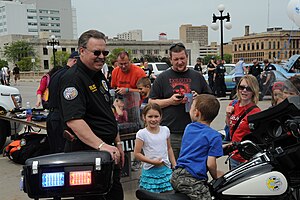This article's tone or style may not reflect the encyclopedic tone used on Wikipedia. (December 2018) |

Community policing or community-oriented policing (COP) is a strategy of policing that focuses on developing relationships with community members. It is a philosophy of full-service policing that is highly personal, where an officer patrols the same area for an extended time and develops a partnership with citizens to collaboratively identify and solve problems.[1]
The goal is to reduce antisocial behavior and low-level crime by police building relationships with the community, at times through mediums such as local agencies.[2][3][4][5][6][7] Some scholarship, such as the broken windows theory, proposes that community policing can reduce serious crimes as well.[8][9]
Community policing is related to problem-oriented policing and intelligence-led policing, and contrasted with reactive policing strategies which were predominant in the late 20th century.[10] Many police forces have teams that focus specifically on community policing.
- ^ Bertus, Ferreira. The Use and Effectiveness of Community Policing in a Democracy. Prod. National Institute of Justice. Washington, D.C., 1996
- ^ Brown, L. and Wycoff, M.D., "Policing Houston: reducing fear and improving services", Crime and Delinquency (Jun. 1987): 71–89.
- ^ Goldstein, H., Problem Oriented Policing, McGraw-Hill Publishing, New York, 1990.
- ^ Cite error: The named reference
ankony12was invoked but never defined (see the help page). - ^ Bobinsky, Robert, "Reflections on community-oriented policing", FBI Law Enforcement Bulletin (Mar. 1994): 15–19.
- ^ Burden, O., "Community policing", National Fraternal Order of Police Journal, Fall/Winter (1992): 31–35.
- ^ Mastrofski, Stephen. and Robert Warden, "Law Enforcement in a time of community policing", Criminology (Nov. 1995): 539–63.
- ^ "Bureau of Justice Statistics (BJS) - Community Policing". www.bjs.gov. Retrieved October 30, 2020.
- ^ Wilson, James Qu.; Kelling, George (1982). "Broken Windows". The Atlantic.
- ^ Bullock, Karen (June 2013). "Community, intelligence-led policing and crime control". Policing and Society. 23 (2): 125–144. doi:10.1080/10439463.2012.671822. ISSN 1043-9463. S2CID 18453522.